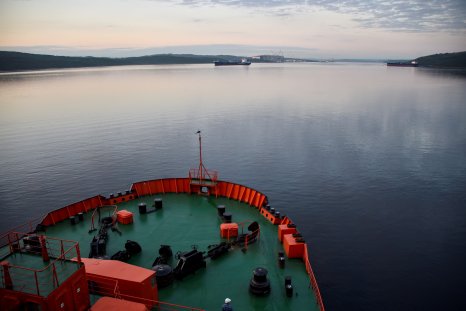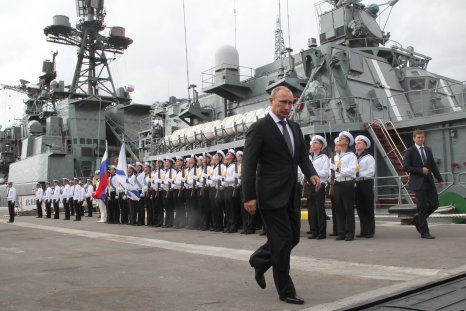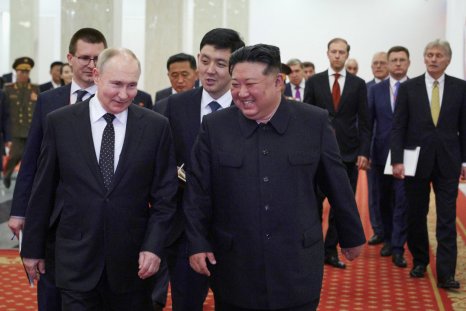A top Azerbaijani official has denied any role in online smear campaigns targeting France's far-flung overseas territories and its metropolitan core, as the two nations accuse one another of fomenting dangerous instability close to the border with Russia.
Following an intense week of diplomacy in which Azerbaijani representatives traveled to the NATO summit in Washington D.C. and the European Political Community summit in the U.K., Hikmet Hajiyev—President Ilham Aliyev's top foreign affairs adviser—told Newsweek that one of the most powerful Western allies is pursuing "very counterproductive" policies in the South Caucasus region bordering Russia.
Baku, the capital of Azerbaijan, has railed against recent French weapon sales to Armenia, which Azerbaijani leaders argue is raising the risk of further conflict between the two longtime adversaries as they seek a peace deal to end more than 35 years of conflict. Among the French systems purchased by Yerevan are self-propelled howitzers and air-defense equipment.
"One of the major concerns is the militarization program by France of Armenia," Hajiyev said, when discussing the influence and involvement of Western powers on the ongoing peace talks with Armenia. "We also urge France to refrain from the policy of seeking geopolitical confrontation or building the new dividing lines in our region."
Baku has been accused of responding by fomenting unrest in France's Pacific overseas territory of New Caledonia, where a deadly wave of secessionist violence has prompted President Emmanuel Macron to declare a state of emergency and deploy additional troops. Azerbaijani flags have been seen flying among the protesters.
New Caledonia is situated in the Coral Sea, approximately 700 miles northeast of the Australian city of Brisbane.
"When it comes to the New Caledonia issue, it has nothing to do with Azerbaijan," Hajiyev said when asked about Baku's alleged role. "We would ask the French side to look at the core and root causes of this problem, instead of blaming some other countries."
Azerbaijan has also been accused of seeking to undermine the upcoming Paris Olympic Games, using a network of social media accounts to disseminate false information and frame French authorities as incapable of successfully hosting the event.
Hajiyev said Baku is not involved and suggested that online criticism of France constitutes "freedom of expression, and we respect that."
Newsweek has contacted the French Foreign Ministry by email to request comment.
Baku and Yerevan, the Armenian capital, have been in conflict over the mountainous Nagorno-Karabakh region since both nations gained independence following the collapse of the Soviet Union in the late 1980s. Internationally recognized as Azerbaijani territory, the region's ethnic Armenian majority nonetheless long enjoyed de facto independence, with support from Yerevan.
Azerbaijan has already established military dominance over its smaller neighbor, scoring a clear victory in the Second Nagorno-Karabakh War in 2020 and effectively settling the decades-long dispute with its lightning September 2023 offensive that captured the entire territory.
The two sides are now engaged in tense peace discussions that aim to delineate the borders of both nations and settle outstanding territorial disputes. Leaders of both countries have said a deal is nearly done, but political maneuvering continues as Baku and Yerevan balance domestic political concerns and grapple with a regional power balance thrown into flux by Russia's war in Ukraine.
Armenia—a member of the Russian-led Collective Security Treaty Organization—is pivoting away from Moscow, furious at Russia's lack of support in the face of alleged Azerbaijani advances. Armenian Prime Minister Nikol Pashinyan is building ties with the Western bloc, much to the Kremlin's chagrin.
Azerbaijan, meanwhile, is expanding economic cooperation with China and neighboring Iran, while also seeking to become a key new energy supplier for Europe and build closer ties with neighbor and NATO member Turkey, with which it has deep linguistic, cultural, and ethnic ties.
Baku is publicly committed to its non-aligned status, and leaders there have dismissed any suggestion that it is drifting into the Western or Eastern blocs solidifying amid the war in Ukraine.
"It reminds me a little bit of the Cold War," Hajiyev said of the evolving geopolitical situation. "In the Cold War, there was also such a saying: 'If you're not with me, then you're against me.'"
"We do not belong to any bloc, and we are not part of the confrontation," he added. "We are just trying to contribute to the peace agenda in our region by virtue of our capabilities."
Disclaimer: The copyright of this article belongs to the original author. Reposting this article is solely for the purpose of information dissemination and does not constitute any investment advice. If there is any infringement, please contact us immediately. We will make corrections or deletions as necessary. Thank you.



